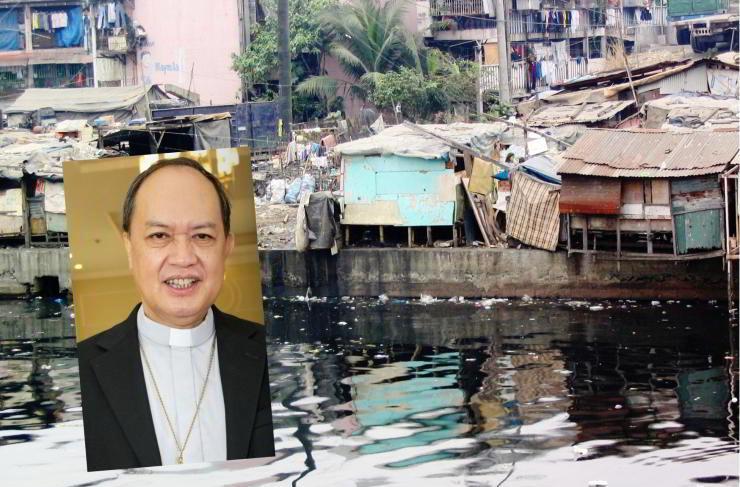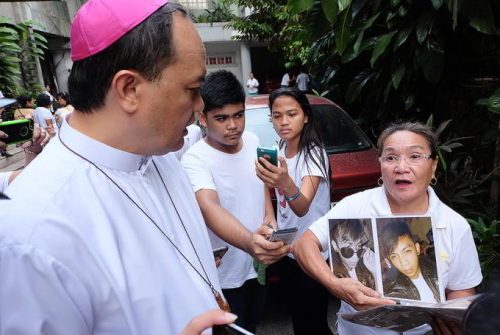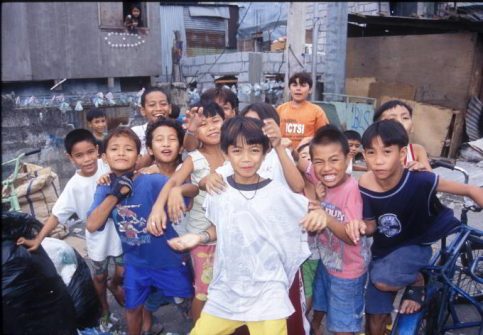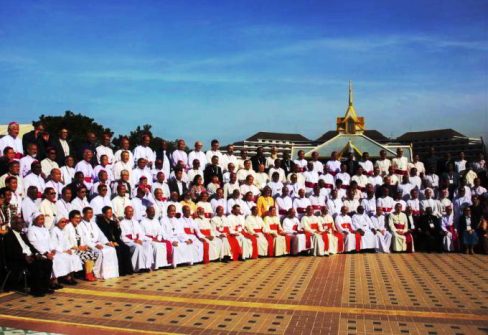The Philippines. The Cardinal’s Challenges.

Monsignor Pablo Virgilio David, of the diocese of Kalookan, on the outskirts of Manila and president of the Episcopal Conference of the Philippines will be created a cardinal on December 7. A recognition of his tireless commitment to the poorest and most oppressed.
His pastoral and charitable commitment led him to take a stand against all forms of injustice and violence. To the point that, during the presidency of Rodrigo Duterte, he was accused of sedition and threatened with death for having denounced human rights violations and extrajudicial executions.
He says: “I received five charges of sedition and other specious charges from the national police, based on the testimony of an unknown person. They had a clear intimidating purpose. I was defended by my brother, a lawyer. Three other bishops were accused, but then the charges were dropped by the prosecutor before reaching court”.

Police car lights at night in Manila. The executions were no longer carried out by uniformed policemen but by masked vigilantes. Shutterstock/Zag Advertising
And he continues: “I had denounced the fact that the so-called war against drug traffickers was immoral, illegal and essentially against the poor. In the Philippines, the death penalty is not permitted. Certainly, the government must fight crime, but it cannot do so with arbitrary and violent methods to the point of systematically killing supposed criminals. I supported the efforts of courageous journalists who documented the abuses irrefutably. Many of the people killed were not armed and did not resist the police intervention. After our complaints, they changed tactics: the executions were no longer carried out by uniformed policemen but by masked vigilantes and were classified as “cases under investigation”, but in reality, there was no investigation. The government officially declares six thousand “victims of the war on drugs”. But there are many more: we believe that the people killed by vigilantes, and not declared by the government, number more than twenty thousand”.

Bishop Pablo Virgilio David listens to a woman denouncing the wave of extrajudicial killings. Photo: CBCPNEWS
How do you judge the current government of President Ferdinand Marcos Jr? “It is too early to judge, but people are suffering from a difficult economic situation. Inflation is reaching 8.7%. Purchasing power is collapsing, food is expensive and those who live on the minimum wage are having a hard time. Many realize that the government systematically uses social media to misinform and manipulate. This also happened during the election campaign. Those who possess digital technology impose social and political behaviour.”
Monsignor Pablo Virgilio David, 62, was born in Betis, in the province of Pampanga. He studied in Manila, Louvain and Jerusalem and taught biblical theology. In 2006 he became auxiliary bishop of San Fernando and since 2016 he has been bishop of Kalookan. Since 2021 he has been president of the Episcopal Conference of the Philippines.
Speaking about his diocese located on the outskirts of the metropolitan area of Manila, Monsignor Pablo Virgilio says: “The diocese of Kalookan has 1.8 million inhabitants, of whom almost 90% are Catholic. Only 10% are reached by our parishes. When I became bishop, I immediately looked for those who remained on the margins of traditional pastoral care. These are, for the most part, people from other provinces who do not even have residency. They live in slums, without adequate services and housing. I was shocked to learn that many children do not even have a birth certificate. For the State they do not exist and do not go to a school or hospital. Children born at home are not registered to avoid paying the fee, however minimal, for the certificate. The consequences are terrible. I have assigned a full-time Sister to do everything she can to register the undocumented children of the diocese”.

Children on the outskirts of Manila. Many children do not have a birth certificate. For the State, they do not exist. File swm
Reflecting on what Pope Francis says about paying attention to the peripheries, he emphasizes “Pope Francis often repeats ‘Go out, go out! The Church, if it is not missionary, is not Church’. He introduced the word ‘peripheries’ into common parlance, to the point that some had to consult the dictionary! This somehow inspired me. One of my priorities is to create ‘missionary stations’. Today we have 18 and about 120 lay leaders (or chaplains), religious sisters or priests. We create basic communities that are more agile and open than traditional parishes, for which we do not have, in any case, the land, resources or personnel. Lay people and Sisters can be excellent leaders. I am very happy with them. There are also 35 diocesan priests”.
Monsignor Pablo Virgilio David, who has also been president of the Philippine Bishops’ Conference for two years, says: “Being president means promoting the collegiality affirmed by the Council. It is a challenge. It is not easy to build consensus: we Filipino bishops come from very different backgrounds that lead to different points of view. There is a need for a lot of interaction and commitment to converge on common pastoral positions that meet today’s challenges”.
Which ones in particular? “There are so many. The first is to combine faith with social and political life and ethical choices. Catholics, for example, see no connection between faith and political choices. They experience them as two parallel things. This is a failure. We must encourage lay people to engage in politics based upon their faith. We bishops have a spiritual and moral role, but the commitment in politics is for the laity. We must humbly admit that many believers do not make choices based on what they have learned in church. Perhaps also because we are not able to offer everyone valid pastoral care. In the best of cases, we reach 20% of Catholics. And so, it is already a huge challenge. Our priests cannot do more. The Philippines is a country with a Catholic majority, the churches are always full and the Masses are numerous. Yet the majority of Catholics do not participate in any way in ecclesial and social life”.

The Federation of Asian Bishops’ Conference (FABC) held their General Conference in Baan Pu Waan, Bangkok, Thailand from 12 to 30 October 2022, marking the 50th anniversary of FABC’s foundation. Photo: Fabs Office
Monsignor Pablo Virgilio is also very involved at the level of the Federation of Asian Bishops’ Conferences (FABC), and was one of the inspirers of the “Bangkok Document” in October 2022 on the occasion of the 50th anniversary of the foundation of the FABC. He says: “It is an important document: it celebrates the 50th anniversary of the FABC and traces its future lines. We have chosen an evangelical icon: the story of the Magi for the five sections. In the first, entitled “Observe” and inspired by the Magi who scrutinize the stars, we describe the realities of Asia, in particular those of the poor, young people and women. The second, “Walking together”, refers to the journey of the Magi who leave their comfort zone to follow a destination. We ask ourselves: what common path? The third, “Discernment”, refers to the reaction to the words of Herod and the high priests. We bishops also have to deal with political and religious authorities and we must practise discernment. The fourth is “Offering one’s gifts”. The last is, “New paths”: like the Magi, blocked by Herod, the Churches of Asia are also called to follow new paths to respond to new obstacles and challenges.” (Photo: Monsignor Pablo Virgilio David. Background: Outskirts of Manila. Swm)
Gianni Criveller/MM



